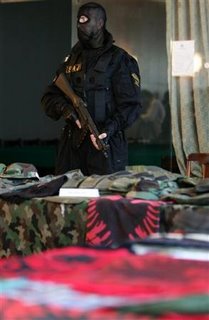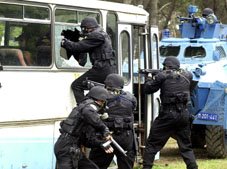
This masked gunman participated in the violent raids in the Albanian-dominant region of Malesia where he and dozens of other policemen viciously beat, arrested and tortured numerous Albanians for alleged acts of terror. To this day no evidence has linked any of those arrested to any crimes, however the abuses continue inside the prison walls and in the villages surrounding Tuz, where daily life has changed considerably. Fear of state suppression is once again making a comeback in this former Yugoslav republic, which has minorities fearing that the independent Montenegro that they voted for has turned the tables against them.
These were the same units that operated under Slobodan Milosevic during the wars with Croatia, Bosnia and parts of Kosova, which left thousands dead and many more displaced. Today Montenegro has created an atmosphere that is damaging inter-ethnic relations, something that has plagued the Balkans for the past 15 years and now continues via the political apparatus in Podgorica.
Podgorica's control of all media outlets has enabled these illegal interrogations to proceed unchallenged, given that any media detractors willing to challenge the legitimacy of the arrests will either be permanently shut down or arrested for "treason."
Moreover, because Montenegro does not have an independent judiciary, one that repects the rule of law in the domestic and international realm, the chances that those being held in jail to receive a fair and speedy trial is nullified. Any and all evidence brought before them, however fabricated it will be, will not be dismissed but used to levy the harshest penalties available. This is an incredulous contradiction to the postulates of democracy and democratic transition. It is imperative that a state claiming to practice democratic traditions and appealing to join the family of Europe must also exercise an independent judiciary that has no influence from other state institutions (ie, Parliament, PM, etc.). This is not the case in Montenegro; what we have in Podgorica is a parallel government that shadows that of Belgrade during the era of the communist party.

State terrorism thus is nothing new in Montenegro. Its hold on the Albanian minority population through oppressive and fear tactics is crucial for them. Over the past several months Albanian nationalism has finally made its way from Kosova to Malesia, evidenced by the unified campaigns to elect members of local parties and oust those that have hindered their progress and development. This show of force has caught the attention of Podgorica and has caused discomfort in Djukanovic's party; the fear of an Albanian (political and social) uprising where the several regions of Malesia e Madhe would socially, ideologically and politically unite would spell trouble in the eyes of Montenegrins. The prospect of an "Ethnic Albania" has caused many sleepless nights in Podgorica, and those prospects drew a bit closer on September 10th when Albanians catapulted their own representatives into Parliament and local offices for the first time ever.
What is important now is to see how Podgorica handles two issues, (1) the victory of Albanians in Malesia with representatives in Parliament and in the urban municipality, and (2) the handling of the prisoners. International pressure on the latter will continue to mount, and Podgorica must be very careful on how they act during their "face-saving" plans.
No comments:
Post a Comment